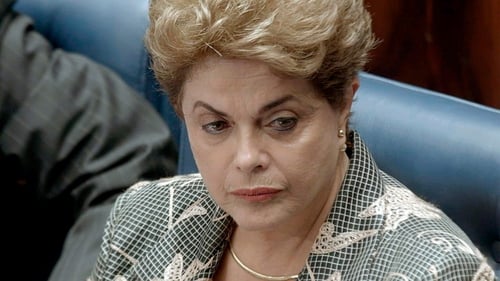Maria Augusta Ramos
출생 : 1964-01-01, Brasília, Distrito Federal, Brazil

Producer
In 2019, the leakage of messages exchanged by authorities in Brazil undermines the credibility of Operation Lava Jato. A group of journalists follows the unfolding of the case, in a sequence of crises that puts Brazilian democracy at risk.

Screenplay
In 2019, the leakage of messages exchanged by authorities in Brazil undermines the credibility of Operation Lava Jato. A group of journalists follows the unfolding of the case, in a sequence of crises that puts Brazilian democracy at risk.

Director
In 2019, the leakage of messages exchanged by authorities in Brazil undermines the credibility of Operation Lava Jato. A group of journalists follows the unfolding of the case, in a sequence of crises that puts Brazilian democracy at risk.

Director
Name given to a specific day on which a series of arson fires are promoted in the Amazon region.

Producer

Executive Producer

Writer

Director

Writer
2016년 8월, 브라질의 첫 여성 대통령인 지우마 호세프가 상원의원에 의해 대통령직에서 해임되었다. 그녀는 일련의 부패 스캔들과 혐의들 후에 공격을 받았다. 이 법정 드라마는 호세프의 변호인단의 관점에서 정치적으로 동기부여된 재판을 기록한다.

Director
2016년 8월, 브라질의 첫 여성 대통령인 지우마 호세프가 상원의원에 의해 대통령직에서 해임되었다. 그녀는 일련의 부패 스캔들과 혐의들 후에 공격을 받았다. 이 법정 드라마는 호세프의 변호인단의 관점에서 정치적으로 동기부여된 재판을 기록한다.

Writer
A portrait of the city of São Paulo through the life of four of its inhabitants: an economist and analyst of the financial market, a metallurgist who works at Volkswagen, a motorcycle courier and a railway worker. Each character calls attention to one aspect of the economy in a period of social tension: the three weeks before the start of the soccer World Cup. The director creates the movie by observing the daily life of the characters, without making interviews or commentaries. Future June aims to reflect on this historical moment and on the ways that the current economic model determines social and human relations.

Director
A portrait of the city of São Paulo through the life of four of its inhabitants: an economist and analyst of the financial market, a metallurgist who works at Volkswagen, a motorcycle courier and a railway worker. Each character calls attention to one aspect of the economy in a period of social tension: the three weeks before the start of the soccer World Cup. The director creates the movie by observing the daily life of the characters, without making interviews or commentaries. Future June aims to reflect on this historical moment and on the ways that the current economic model determines social and human relations.

Director
Like a road movie, the film accompanies a water delivery truck through the Brazilian landscapes of the Sertão region, plagued by drought. Between fiction and documentary, the driver’s trip bears witness to a determined population endeavouring to live out their daily lives, while the sterile words of politicians seem to soar over the arid lands. A collective portrait that respects the right distance.

Director
It examines the daily life of the residents and cops at a Rio de Janeiro favela one year after the arrival of a Pacifying Police Unit.

Writer
In Rio de Janeiro, over many days, the director Maria Ramos witnesses and films the judgment of several teenagers accused of stealing, trafficking and murdering. Underage youths are protected by the Brazilian laws and their faces can not be exposed; therefore, they are replaced by teenagers from poor communities.

Director
In Rio de Janeiro, over many days, the director Maria Ramos witnesses and films the judgment of several teenagers accused of stealing, trafficking and murdering. Underage youths are protected by the Brazilian laws and their faces can not be exposed; therefore, they are replaced by teenagers from poor communities.

Writer
In Justiça, Maria Ramos puts a camera where many Brazilians have never been - a criminal courtroom in Rio de Janeiro, following the daily routine of several characters. There are those that work there every day (public attorneys, judges, and prosecutors) and those that are merely passing through (the accused). The camera is used as an instrument that sees the social theatre, the structures of power - that is to say, what is, in general, invisible to us. The corridors of the Courts of Justice, the design and layout of the courtroom, the discourse, the codes, postures - all the little visual details and sounds become relevant.

Director
In Justiça, Maria Ramos puts a camera where many Brazilians have never been - a criminal courtroom in Rio de Janeiro, following the daily routine of several characters. There are those that work there every day (public attorneys, judges, and prosecutors) and those that are merely passing through (the accused). The camera is used as an instrument that sees the social theatre, the structures of power - that is to say, what is, in general, invisible to us. The corridors of the Courts of Justice, the design and layout of the courtroom, the discourse, the codes, postures - all the little visual details and sounds become relevant.

Writer
Desi is a young girl living in Amsterdam with an unconventional family situation. A portrait of a remarkably strong girl.

Director
Desi is a young girl living in Amsterdam with an unconventional family situation. A portrait of a remarkably strong girl.

Director
Documentary about the Brazilian capital














